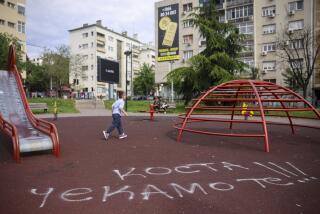Bosnia Peace Talks Set; Panic Takes New Post
- Share via
SARAJEVO, Bosnia-Herzegovina — Ground fighting and artillery attacks were reported from several fronts Tuesday as leaders of Bosnia’s three warring factions agreed to unconditional peace talks in London and Yugoslavia’s new prime minister, California millionaire Milan Panic, vowed to silence the guns.
Lord Carrington, the European Community’s chief negotiator on Yugoslavia, will hold separate talks with Bosnian Foreign Minister Haris Silajdzic; Radovan Karadzic, the main Serb political leader, and Mate Boban, a leader of Bosnia’s Croat community, today in London.
Peace talks Carrington held with the leaders of the three communities in Sarajevo earlier this month failed and were followed by one of the worst upsurges in fighting since the siege began.
In Belgrade, the federal Parliament endorsed Panic as the first prime minister of the new Yugoslavia, comprising Serbia and Montenegro, two of the six republics that used to make up the old Yugoslavia.
“The new federal government will do its utmost to have all sides immediately cease fire,” Panic said in a speech preceding the vote. “I promise personally to do everything to have the heavy armament the former federal army left behind in Bosnia withdrawn as soon as possible.”
Panic, who was visibly nervous, made no reference to Serbian President Slobodan Milosevic, the man widely blamed for the ethnic bloodshed that followed the secession of the former republics of Slovenia, Croatia, Macedonia and Bosnia-Herzegovina.
Radio reports and sources close to the United Nations said Serbian forces were pressing on with an offensive to capture Goradze, the only major town in eastern Bosnia still under Muslim control. The war in Bosnia pits Serbs opposed to independence against Muslims, Croats and other Bosnians.
All communications have been cut with Goradze, where about 70,000 people are trapped by Serb siege forces. Details of the situation, described as increasingly desperate, are filtering out through ham radio operators.
In the Bosnian capital of Sarajevo, the level of fighting during the day was relatively low. Early Tuesday, mortar shells landed near the U.N. headquarters in the second attack on the area within 12 hours.
In Washington on Tuesday, the Pentagon said that a U.S. Navy warship in the Adriatic Sea, on four separate encounters this weekend, activated its fire control radar--a first step in the missile-firing process--against three planes it believed to be Yugoslav fighters as the aircraft approached the American ship from Yugoslav airspace.
In each encounter, after approaching to as close as five miles from the warship, the plane appeared to respond to the vessel’s action by turning away and returning to a base in Yugoslavia, Pentagon officials said.
In a fifth incident over the weekend, the same vessel, the cruiser Biddle, used its fire control radar to “illuminate” a British military cargo jet delivering relief supplies to Bosnia. After the British aircraft identified itself, the potentially dangerous encounter ended, and the two craft communicated by radio.
The planes’ exact identities, as well as their intentions, remain unclear, officials said.
More to Read
Sign up for Essential California
The most important California stories and recommendations in your inbox every morning.
You may occasionally receive promotional content from the Los Angeles Times.













